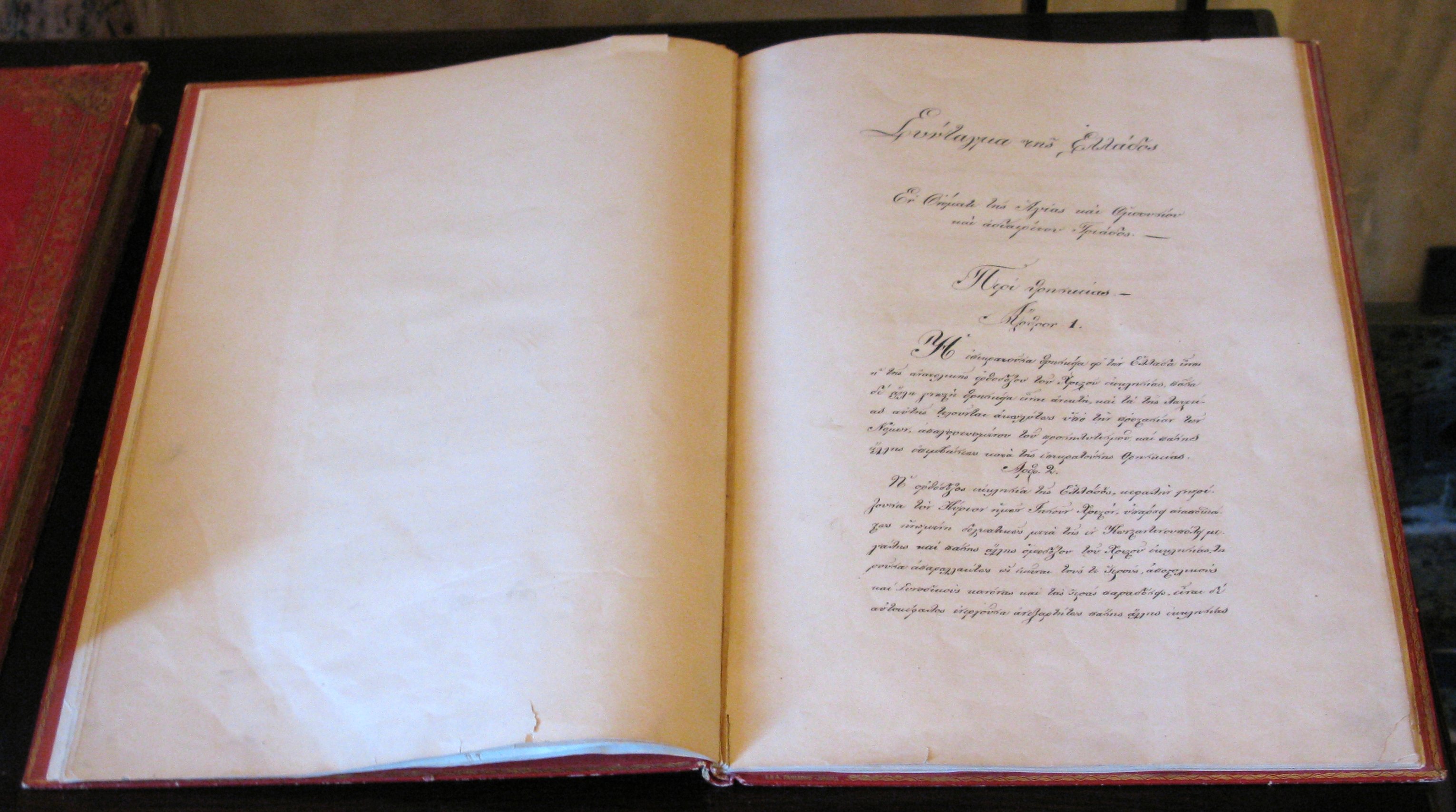|
Greek Constitution Of 1864
The Second National Assembly of the Hellenes took place in Athens (1863–1864) and dealt both with the election of a new sovereign as well as with the drafting of a new Constitution, thereby implementing the transition from constitutional monarchy to a crowned republic. Following the refusal of Prince Alfred of Great Britain (who was elected by an overwhelming majority in the first referendum of the country in November 1862) to accept the crown of the Kingdom of Greece, the government offered the crown to the Danish prince George Christian Willem of the House of Schleswig-Holstein-Sonderburg-Glücksburg, who was crowned constitutional King of Greece under the name "George I, King of the Hellenes". The Constitution of 1864 was drafted following the models of the Constitutions of Belgium of 1831 and of Denmark of 1849, and established in clear terms the principle of popular sovereignty, since the only legislative body with reversionary powers was now the Parliament. Furthermore, a ... [...More Info...] [...Related Items...] OR: [Wikipedia] [Google] [Baidu] |
Hellene
The Greeks or Hellenes (; el, Έλληνες, ''Éllines'' ) are an ethnic group and nation indigenous to the Eastern Mediterranean and the Black Sea regions, namely Greece, Cyprus, Albania, Italy, Turkey, Egypt, and, to a lesser extent, other countries surrounding the Mediterranean Sea. They also form a significant diaspora (), with Greek communities established around the world.. Greek colonies and communities have been historically established on the shores of the Mediterranean Sea and Black Sea, but the Greek people themselves have always been centered on the Aegean and Ionian seas, where the Greek language has been spoken since the Bronze Age.. Until the early 20th century, Greeks were distributed between the Greek peninsula, the western coast of Asia Minor, the Black Sea coast, Cappadocia in central Anatolia, Egypt, the Balkans, Cyprus, and Constantinople. Many of these regions coincided to a large extent with the borders of the Byzantine Empire of the late 11th cent ... [...More Info...] [...Related Items...] OR: [Wikipedia] [Google] [Baidu] |
Greek Constitution Of 1844
The first constitution of the Kingdom of Greece was the Greek Constitution of 1844. On 3 September 1843, the military garrison of Athens, with the help of citizens, rebelled and demanded from King Otto the concession of a Constitution. The Constitution that was proclaimed in March 1844 came from the workings of the "Third of September National Assembly of the Hellenes in Athens" and was a Constitutional Pact, in other words a contract between the monarch and the Nation. This Constitution re-established the constitutional monarchy and was based on the French Constitution of 1830 and the Belgian Constitution of 1831. Its main provisions were the following: It established the principle of monarchical sovereignty, as the monarch was the decisive power of the State; the legislative power was to be exercised by the King - who also had the right to ratify the laws - by the Parliament, and by the Senate. The members of the Parliament could be no less than 80 and they were elected f ... [...More Info...] [...Related Items...] OR: [Wikipedia] [Google] [Baidu] |
History Of Greece (1863–1909)
The history of Greece encompasses the history of the territory of the modern nation-state of Greece as well as that of the Greek people and the areas they inhabited and ruled historically. The scope of Greek habitation and rule has varied throughout the ages and as a result, the history of Greece is similarly elastic in what it includes. Generally, the history of Greece is divided into the following periods: * Paleolithic Greece, starting 3.3 million years ago and ending in 20000 BC. Significant geomorphological and climatic changes occurred in the modern Greek area which were definitive for the development of fauna and flora and the survival of ''Homo sapiens'' in the region. * Mesolithic Greece, starting in 13000 BC and ending around 7000 BC, was a period of long and slow development of primitive human "proto-communities". *Neolithic Greece, beginning with the establishment of agricultural societies around 7000 BC and ending BC, was a vital part of the early history of Gre ... [...More Info...] [...Related Items...] OR: [Wikipedia] [Google] [Baidu] |
1864 In Greece
Events January–March * January 13 – American songwriter Stephen Foster ("Oh! Susanna", "Old Folks at Home") dies aged 37 in New York City, leaving a scrap of paper reading "Dear friends and gentle hearts". His parlor song " Beautiful Dreamer" is published in March. * January 16 – Denmark rejects an Austrian-Prussian ultimatum to repeal the Danish Constitution, which says that Schleswig-Holstein is part of Denmark. * January 21 – New Zealand Wars: The Tauranga campaign begins. * February – John Wisden publishes '' The Cricketer's Almanack for the year 1864'' in England; it will go on to become the major annual cricket reference publication. * February 1 – Danish-Prussian War (Second Schleswig War): 57,000 Austrian and Prussian troops cross the Eider River into Denmark. * February 15 – Heineken brewery founded in Netherlands. * February 17 – American Civil War: The tiny Confederate hand-propelled submarine ''H. L. Hun ... [...More Info...] [...Related Items...] OR: [Wikipedia] [Google] [Baidu] |


